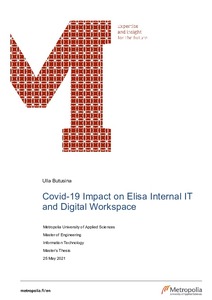Implementation of HR Systems in a Remote Work Environment : case study: Strategies and Tools for Implementing HR Systems in a Remote Work Environment at The Mobius Agency
Macejková, Simona (2025)
Macejková, Simona
2025
Julkaisun pysyvä osoite on
https://urn.fi/URN:NBN:fi:amk-2025051913021
https://urn.fi/URN:NBN:fi:amk-2025051913021
Tiivistelmä
This thesis investigates the implementation of Human Resource systems within remote work arrangements, using The Mobius Agency as a case study. As a mostly remote based company with a geographically dispersed team, TMA currently operates using fragmented and manual HR processes, resulting in inefficiency, reduced transparency, and inconsistent employee experiences.
To guide the research, this study starts with a theoretical framework of the evolving fields of remote work and Human Resource Management. It examines how technology-enabled remote work and flexible arrangements have changed traditional HRM activities, and its requirements new approaches to recruitment, performance management, employee engagement, and well-being. This framework provides the basis for the investigation into how HR systems can be implemented the best to meet organizational objectives as well as employee requirements within remote work arrangements.
Data was collected through an online survey of employees from a variety of roles and levels of tenure within the organisation. The findings demonstrate keen demand for the introduction of a centralised digital HR platform—particularly for time tracking, leave management, and internal communication. While most respondents lacked prior experience with HR systems, they showed high digital confidence and eagerness to adopt new tools, provided that effective onboarding, training, and user-centred design were followed.
The study recommends a phased implementation strategy, supported by internal champions, comprehensive training guides, and transparent communication to enable smooth adaption. The study concludes that virtual organisations like TMA can successfully introduce HR systems by aligning technology with employee needs and fostering inclusive change management.
To guide the research, this study starts with a theoretical framework of the evolving fields of remote work and Human Resource Management. It examines how technology-enabled remote work and flexible arrangements have changed traditional HRM activities, and its requirements new approaches to recruitment, performance management, employee engagement, and well-being. This framework provides the basis for the investigation into how HR systems can be implemented the best to meet organizational objectives as well as employee requirements within remote work arrangements.
Data was collected through an online survey of employees from a variety of roles and levels of tenure within the organisation. The findings demonstrate keen demand for the introduction of a centralised digital HR platform—particularly for time tracking, leave management, and internal communication. While most respondents lacked prior experience with HR systems, they showed high digital confidence and eagerness to adopt new tools, provided that effective onboarding, training, and user-centred design were followed.
The study recommends a phased implementation strategy, supported by internal champions, comprehensive training guides, and transparent communication to enable smooth adaption. The study concludes that virtual organisations like TMA can successfully introduce HR systems by aligning technology with employee needs and fostering inclusive change management.
Kokoelmat
Samankaltainen aineisto
Näytetään aineisto, joilla on samankaltaisia nimekkeitä, tekijöitä tai asiasanoja.
-
Management practices supporting lecturing staff during remote working at a selected university of technology
Swarts, Ilze (2023)Due to the global COVID-19 outbreak, higher education institutions worldwide had to abruptly change their working arrangements to remote working, without sufficient time to ensure that the organisational context is conducive ... -
The impact of the pandemic on ways of working : managing remote teams
Petri, Fevronia (2025)This thesis aimed to investigate the new ways of working that emerged as a result to the pandemic. The past years have affected the corporate world after a forced change in the working culture where companies had to quickly ... -
Covid-19 Impact on Elisa Internal IT and Digital Workspace
Butusina, Ulla (2021)In order to avoid Covid-19 infections, the government officials recommended Finnish employees to work remotely starting from spring 2020. The Elisa corporation followed this recommendation. Research was performed for ...



